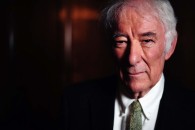Wakes, in my experience, are great craic.
That is not to make light of the deceased or of the pain of kith and kin, but more a nod to the mixture of joyful reminiscence and celebration that distracts for a while the ineluctable sense of loss.
And so it was at the Lyric Theatre last night, when, as Frank Ormsby put it, the first-ever Seamus Heaney Tribute Band got together to pay tribute to a lovely man who happened to be a poet.
The tributes would have been the same had Seamus shunned the pen for the shovel and people were judged not by their occupation but by the content of their character. However, it is through his poetry that Heaney rang a bell in the souls of so many and gave us “a bounty that will flow all the days of our lives,” as Arts Council chairman, Bob Collins so eloquently put it.
Last night’s event, brought together at very short notice by Lyric Theatre trustee Stephen Douds, tapped into that bounty which each of the ten guests either reciting Seamus’s poems while others read from their own work.
All were memorable. Stella Cusker read from Heaney’s speech at the Lyric in April 2012; Michael Longley, a dear and long standing friend of Heaney’s, shared some anecdotes and read a poem called Boat (about his and Seamus’s mortality) as well as two poems by Heaney himself.
Sinead Morrissey fought successfully to hold back the tears as she read Tollund Man, a poem she taught students in Schleswig-Holstein in the German Danish border. She was less successful later as the stage lights caught the tears in her eyes and her trembling hands.
Bob Collins then gave a wonderful eulogy to Heaney which clearly touched each member of the audience and which I hope will appear in print somewhere while the mood was also beautifully captured by Neil Martin with his rendition on the cello of Port na bPúcaí, a tune that inspired Heaney to write The Given Note.
 Damian Gorman read the poem Postscript and one of his own, After the Poet about Victor Jara but which was apt too for the night that was in it.
Damian Gorman read the poem Postscript and one of his own, After the Poet about Victor Jara but which was apt too for the night that was in it.
Eamon Hughes gave an academic but very personal account of Heaney, man and work, while Frank Ormsby, who read the heart-rending poem about Sean Armstrong who was murdered during the troubles, A Postcard from North Antrim.
Belfast Lord Mayor, Máirtín Ó Muilleoir, paid a visit and read a song/poem in Irish, An Chéad Mháirt de Fhómhar which beautifully captures the sorrow and anger at the loss of a loved one.
Glenn Patterson read from his new book before Neil Martin returned to play a tune which some think goes back to the 13th century, a tune called The Parting of Friends.
It was left to Mark Carruthers to thank the people who had given so generously of their time to partake in this tribute to Seamus Heaney before Ian McIlhinney read probably the Bellaghy man’s most quoted poem, The Cure at Troy:
History says, Don’t hope
On this side of the grave,
But then, once in a lifetime
The longed-for tidal wave
Of justice can rise up
And hope and history rhyme.
And so the night ended with a round of applause aimed at an empty podium as we pictured Seamus Heaney, that glint in his eye, the roguish smile, now beguiling the poetic Pantheon in the hereafter.


Cur síos galánta Robert 🙂
Galánta x
Iontach deas, a Robert.